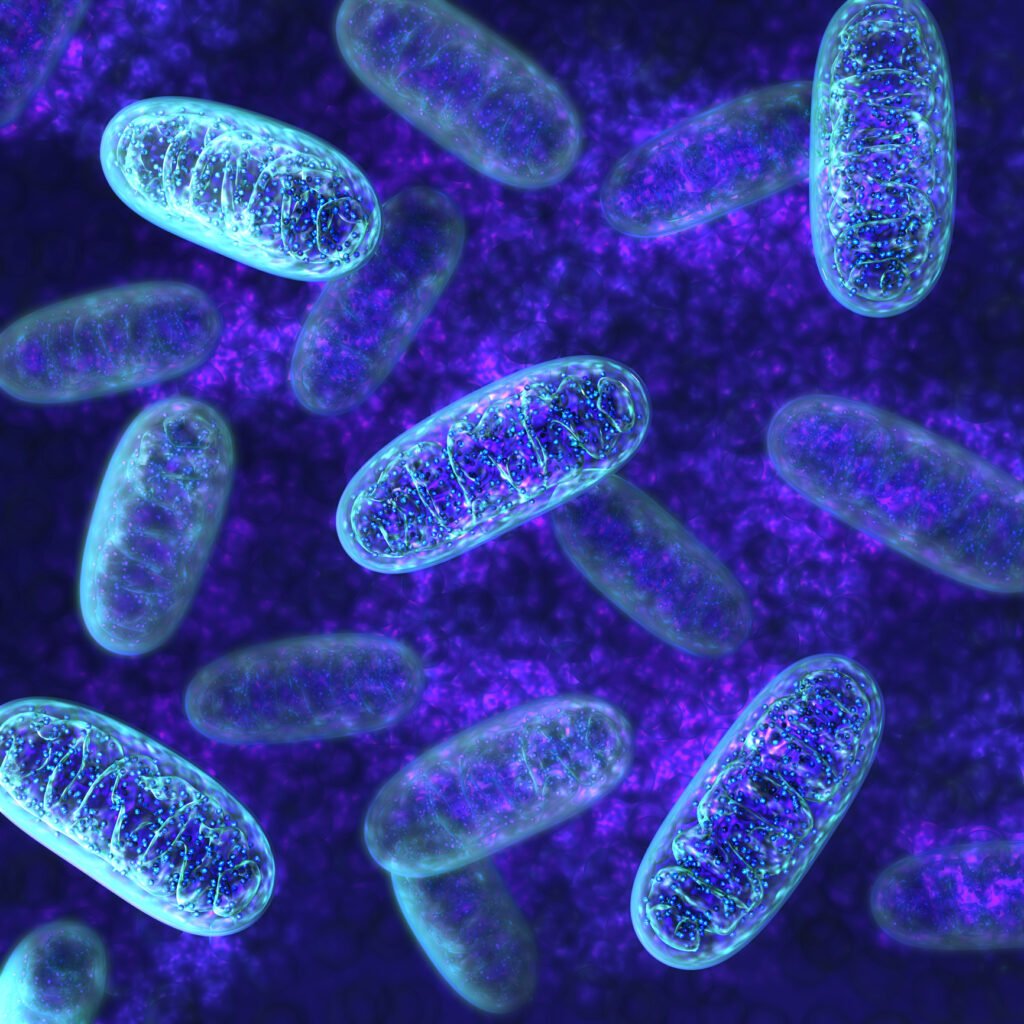We need to keep our Mitochondria healthy.
Why this is important:
As we age, Coenzyme Q10 is a necessary supplemental compound we should take to maintain healthy mitochondria. Coenzyme Q10, (also known as ubiquinone or CoQ10), is a vitamin-like compound found in the bodies of almost all life forms. CoQ10 is found primarily within mitochondria, where it is a vital part of the energy production process and also acts as a free radical neutralizing antioxidant.
Natural production of CoQ10 can decrease with age, illness and lifestyle factors like diet and smoking. When CoQ10 levels diminish, we tend to see poorly functioning mitochondria and increased free radical damage which is now known to contribute to a whole host of health concerns. (See my blog: Mitochondria Health, It’s very, very important)

Simple overview:
Why MitoQ versus other C0Q10 supplements?
MitoQ is rapidly and actively absorbed from the gut and readily passes through other biological membranes. Once inside the cell, MitoQ molecules are attracted to and transported inside the doubled wall mitochondria where they are able to reach concentrations up to 1,000 times higher than in the rest of the cell, something that no other CoQ10 formulation comes anywhere close to. Once it neutralizes a free radical, MitoQ is recycled back to its active form allowing it to perform this task over and over again.
How does MitoQ work:
“ High levels of the MitoQ molecules find their way into the mitochondria. It is so effective that the recommended dose (10mg daily) can be significantly less than the normal CoQ10 dose (up to 200mg), yet still provide a high amount of molecule directly into the mitochondria. Additionally, once it neutralizes a free radical, MitoQ is recycled back to its active form allowing it to perform this task over and over again.”
MitoQ Ltd.
Dive a little deeper:
How do we know MitoQ is one of the best CoQ10 supplements on the market?
“The vastly improved absorption of MitoQ into the mitochondria provides a huge antioxidant boost and helps to enhance energy metabolism in poorly functioning mitochondria. This gives our cells the energy they need to work optimally, and the antioxidant reserves they need to keep free radical numbers in check.”
The answers comes from over 577 scientific studies of MitoQ since 2002, and which are currently listed on PubMed. Leading institutions around the world have studied MitoQ’s cellular health optimization in over 700 peer-reviewed scientific papers and 14 clinical trials to date. Studies aren’t cheap, and funding for studies is limited, so if a molecule has that much interest from researchers, then there certainly is validity in the claims.
Learn more from their website www.mitoq.com
Into the details:
From recent Randomized Controlled Trials, MitoQ has found to help in healthy aging and anti-aging.
Cardiovascular Disease
PMID: 37326998 Excessive reactive oxygen species production by mitochondria (mtROS) is a key contributor to age-related vascular endothelial dysfunction. ” Mitochondria-targeted antioxidants such as MitoQ represent a promising novel strategy for the preservation of vascular endothelial function with advancing age and the prevention of age-related CVD (Cardiovascular disease).”
[Endothelial dysfunction is a type of non-obstructive coronary disease in which there are no heart artery blockages, but the large blood vessels on the heart’s surface constrict (narrow) instead of dilating (opening). This condition tends to affect more women than men and causes chronic chest pain. – Stanfordhealthcare.org]
PMID: 37560769 “Our novel findings showed that 4-wk supplementation of MitoQ was well tolerated and improved macrovascular endothelial function, arterial hemodynamics, and microvascular function in patients with stage 3-4 chronic kidney disease. Our mechanistic findings also suggest that MitoQ improved microvascular function in part by reducing the NADPH oxidase contribution to vascular dysfunction.”
PMID: 32706261 These findings suggest that the acute oral intake of MitoQ-mediated improvements in vascular mitochondria play a pivotal role for improving endothelial function, the redox environment, and skeletal muscle performance in PAD (Peripheral artery disease). Acute MitoQ intake is also effective for improving maximal walking capacity and delaying the onset of claudication in patients with PAD.
[Peripheral artery disease (also called: peripheral vascular disease) is a sign of fatty deposits and calcium building up in the walls of the arteries (atherosclerosis). Risk factors include aging, diabetes, and smoking. – Mayo Clinic]
AHA Journal MitoQ treatment also reduced aortic stiffness in participants exhibiting age-related aortic stiffening in the untreated state and decreased plasma oxidized LDL, a marker of oxidative stress, without altering circulating markers of inflammation or traditional CVD risk factors.
Endurance training
PMID: 35623315 “…Data suggest that training-induced increases in peak power are enhanced following MitoQ supplementation…in untrained middle-aged men”
PMID: 34419082 When tested on trial performance in middle-aged trained male cyclists: “MitoQ supplementation may be an effective nutritional strategy to attenuate exercise-induced increases in oxidative damage to lipids and improve cycling performance.”
[Lipids are fatty compounds that perform a variety of functions in your body. They’re part of your cell membranes and help control what goes in and out of your cells. They help with moving and storing energy, absorbing vitamins and making hormones. – Cleveland Clinic ]
PMID: 32810739 Can MitoQ – a redox active mitochondrial targeted quinone – reduce exercise-induced mtDNA damage? “Our work is the first to show a protective effect of chronic MitoQ supplementation on the mitochondrial and nuclear genomes in lymphocytes and human muscle tissue following exercise, which is important for genome stability.”

